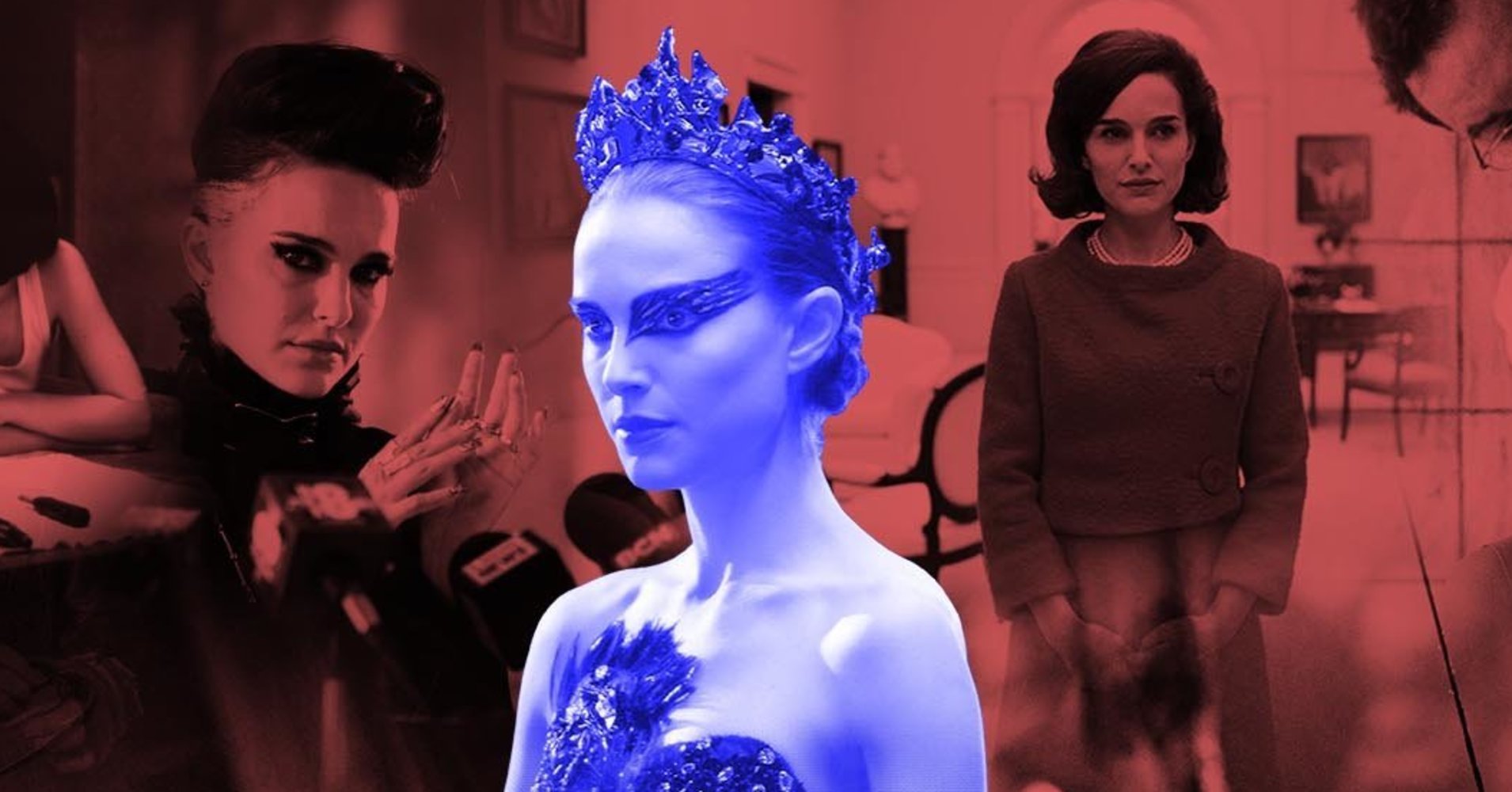[ad_1]
In the little-seen 2016 curiosity “Planetarium,” Natalie Portman plays a world-traveling medium whose charisma turns her into a movie star. Surveying footage from a recent seance, a filmmaker targeting the medium for his next project tries to pinpoint her silver-screen allure. “A presence, skin tone, spirit, character,” he fumbles before landing on a pronouncement. “She’s the one I watched for the entire scene.”
The filmmaker’s struggle to determine why he’s so drawn to this fictional Portman rings true. At 37, she is one of today’s more polarizing actresses. Drop her name among critics or dedicated moviegoers, and they’ll fire back with a cavalcade of unwavering opinions. Some find her effortless and beguiling; to others, she is blank and unworldly ― a ruthless divide that’s existed almost as long as Portman has been famous, i.e., the past 24 years, since her debut in 1994′s “The Professional” at age 13.
I, for one, love Natalie Portman, and always have, though it’s sometimes hard to muster a more detailed reason than the aforementioned “Planetarium” character’s. As Portman matured into an A-lister, she straddled an odd line between ingenue and firebrand: too pure to be the rebel, too earthy to be the maiden ― popular culture’s madonna-whore complex writ large. That paradox has left critics, as well as some casting directors, unsure of how to see her, but it’s also yielded Portman’s fiercest performances.
When she first appears midway into Brady Corbet’s audacious new film “Vox Lux,” playing an addled pop star with a jarring connection to terrorism, a lightning bolt might as well announce her arrival. Coated in thick eyeliner and punk-glam black garb, Portman’s Celeste scolds and scorns and screams at everyone in her path, evoking a question asked of the actress’ career-defining “Black Swan” ballerina: “What happened to my sweet girl?” She might as well respond with the same abrasive “She’s gone!” The Portman perceived to be naive ― the one associated with “Star Wars,” “Where the Heart Is” and “Garden State” ― is nowhere to be found.
But that’s the thing. Portman’s persona was never built on sweetness, no matter how many professional reviewers still affix it to her identity. Since the get-go, she has been one of Hollywood’s most daring performers, refusing to hang her image on any one mood, moment or mantra.
As “Vox Lux” rolls into theaters, having already conjured contentious reactions at fall’s big festivals, I revisited Portman’s catalog to try to figure out what makes her both a primo movie star and a cultural spark plug. To chart this evolution, we have to start where all complicated journeys begin: the mid-’90s.
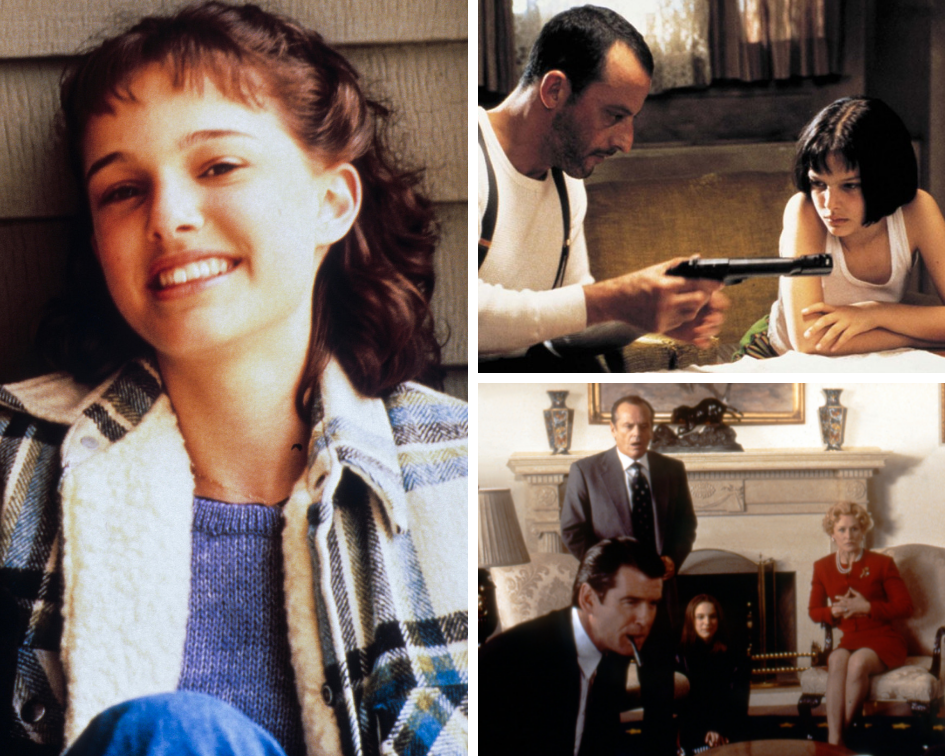
Precociousness: An Origin Story
We tend to remember child stars whose breakout material outpaced their own maturity: Jodie Foster (“Taxi Driver”), Christian Bale (“Empire of the Sun”), Jacob Tremblay (“Room”). That’s certainly the case for Natalie Portman, who was born in Jerusalem, moved to the United States at age 3 and turned down an offer to become a Revlon model at age 10 so she could focus on launching an acting career. After understudying (alongside Britney Spears) in “Ruthless! The Musical” off-Broadway, Portman booked her big break: Luc Besson’s stylish crime thriller “The Professional,” otherwise known as “Léon: The Professional.”
It’s as daring an entrance as they come. When we first see Portman, playing a 12-year-old victim of domestic abuse, she is smoking a cigarette, outwitting adults and sporting a sophisticated Louise Brooks bob. This would become the model for Portman’s early roles, even ones untouched by violence: hyperarticulate, unflappable, anxious to grow up. Her voice was coarser then, but she had the same wide grin, at once inviting and bittersweet. The filmmakers who cast her ― all men, of course ― seized on that wise-beyond-her-years dichotomy.
In “The Professional,” she falls in love with a hitman (Jean Reno) a few decades her senior, treating him to chipper renditions of “Like a Virgin” and Marilyn Monroe’s breathy “Happy Birthday” and insisting he train her to become a vengeance-seeking assassin. In her second film, Michael Mann’s “Heat” (1995), she plays the suicidal stepdaughter of an inattentive police officer (Al Pacino). In Ted Demme’s ensemble dramedy “Beautiful Girls” (1996), Portman is a Rory Gilmore type who quotes “Romeo and Juliet” while flirting with an adult neighbor (Timothy Hutton) home for his wintry high school reunion. In Tim Burton’s clever spoof “Mars Attacks!” (1996), she’s the American president’s nonchalant daughter, more interested in reading “Siddhartha” than succumbing to extraterrestrial frenzy. That same year, at 16, Portman made her Broadway debut in the Holocaust drama “The Diary of Anne Frank.”
Together with Woody Allen’s “Everyone Says I Love You” (1996), these movies crystallized Portman’s persona. She is arguably the best part of each, that bright newcomer who draws us in with her wry showmanship. She established a way of cocking her head or peering out from the corner of her eyes that was magnetizing, even soul-baring. Critics took notice. The New York Times’ Janet Maslin called her “photogenic”; Entertainment Weekly’s Lisa Schwarzbaum called her “exquisite.”
Underscoring her precociousness, Portman never once played a typical kid role, which, if Demme is to be believed, was intentional: “She doesn’t want to do ‘The Baby-Sitters Club,’” the director reportedly said.
Off-screen, Portman’s wisdom matched that of her characters. She expressed a desire to attend college and waxed poetic about projects, leaving the impression that she was as much in the driver’s seat as her parents and agents. In an era when tabloid culture hadn’t yet proliferated into the online maelstrom it would soon become, Portman evinced a key awareness of fame and image-building. Not wanting to be sexualized, she’d asked Besson to remove a couple of scenes from “The Professional” because she felt their nudity and violence “went too far.” For similar reasons, she then turned down the title role in 1997′s “Lolita” remake and Christina Ricci’s brooding part in “The Ice Storm.”
“I met with the director, but I immediately told him there’s no way I’m gonna do this movie,” Portman said of “Lolita” director Adrian Lyne. “Kubrick’s film of the book is great because nothing is really shown, but this one will be explicit. He told me they’d use body doubles, but I said people will still think it’s me, so no thank you.”
Despite her best efforts, playing urbane teens still saddled Portman with a tacit sensuality, which, she would later reveal, resulted in horrific fan letters that treated her as a “rape fantasy.” (It’s also worth nothing that Besson is currently under investigation for alleged sexual misconduct unrelated to Portman.) Older male characters seemed aroused by her in ways that today feel uncomfortable, in turn giving future (male) directors license to further the narrative of Portman’s burgeoning madonna-whore duality. When “Star Wars” accelerated her career tenfold in 1999, the dichotomy of Natalie Portman became first-rate capital.
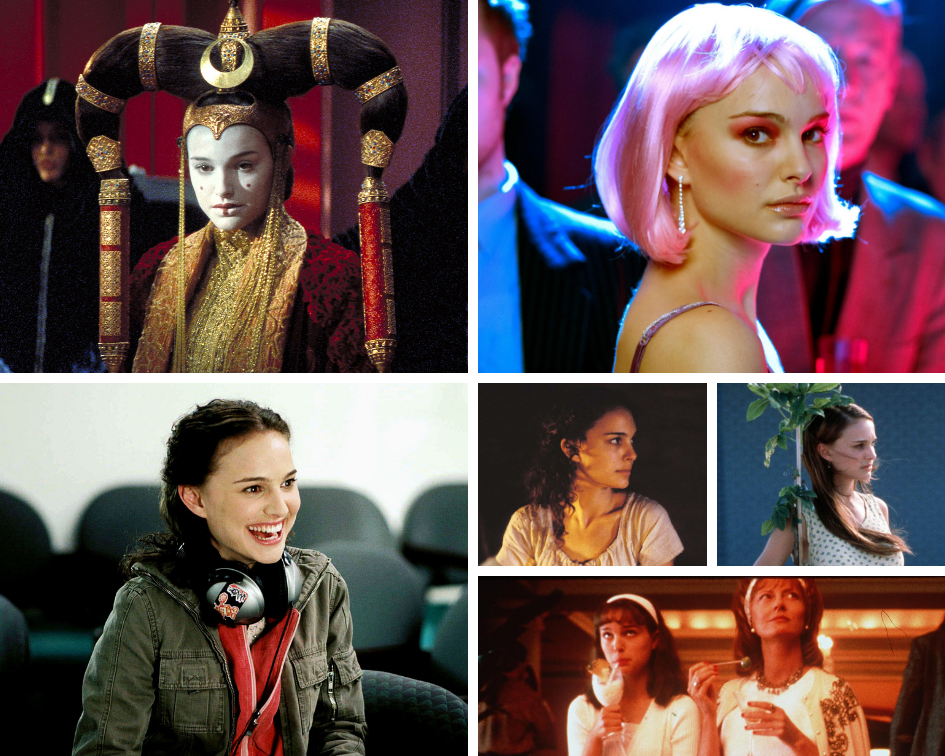
Toning It Down: The Innocence Years
After Portman built a career playing characters who behaved beyond their age, her late teens and early 20s sent her in the opposite direction. Portman’s voice grew thinner and her face squarer, and suddenly she was playing young adults startled to find themselves in unfortunate circumstances.
First (and foremost), she was a face of “Star Wars” mania, portraying Padmé Amidala, an idealistic queen whose Old Hollywood-type beauty was offset only by her tepid energy and periodic Kabuki makeup. It was the first time critics turned on Portman. Maslin, the New York Times writer who’d once praised her, said she was “wooden as can be”; in Time magazine, Richard Corliss called her “flat.” Suddenly she was on the covers of Vanity Fair, Entertainment Weekly, Seventeen and Premiere, all while receiving the worst reviews of her life.
I could write an entire dissertation on Portman through the lens of the “Star Wars” prequels. (You try making three long-as-hell movies that poorly written.) George Lucas, never known for conjuring great performances, handed her wooden dialogue, and she responded in kind, surrounded by green screens and merchandising ploys. If there was any emotion on Portman’s heavily caked face, it was boredom. But she remained a trooper, re-upping the authorship she’d long applied to her roles: “It’s really important for girls to see women in leadership positions, because you don’t see that a lot on the screen,” she said at age 17, before the notion had become a defining talking point in Hollywood.
After a visionary inauguration, Portman suddenly seemed like a cog in a Hollywood machine that was only just beginning its addiction to franchises and intellectual property. Her other movies released during the “Star Wars” years ― 1999 to 2005, that is, when she also earned a Harvard degree in psychology ― did little to bolster an idea of Portman that extended beyond what her old pal Britney Spears might call “not a girl, not yet a woman.”
In the underappreciated dramedy “Anywhere but Here,” released to middling fanfare in November 1999, she held her own opposite Susan Sarandon, playing a moody teen who parents her unreliable mother but still maintains a girlish coming-of-age arc. (The movie netted Portman’s first Golden Globe nomination but lost awards momentum after failing to strike box-office gold.) Next, she was a pregnant Oklahoma 17-year-old in “Where the Heart Is” (2000), a contrived comedy that doubled as Walmart product placement. In 2001, theater critics flayed her turn as Nina in Mike Nichols’ Central Park staging of “The Seagull” co-starring Meryl Streep and Philip Seymour Hoffman, indicating Portman might not be experienced enough for Chekov. Nichols then recommended her to “Cold Mountain” director Anthony Minghella, who cast Portman in a fiery and poignant cameo that nonetheless read like a variation on the same theme; her desperate widow was a troubled innocent facing hardship.
Portman was aware that her celebrity was rising and her prestige dipping. (”‘Star Wars’ had come out around the time of ‘Seagull,’ and everyone thought I was a horrible actress,” she would later say. “I was in the biggest-grossing movie of the decade, and no director wanted to work with me.”) But, for better and worse, along came two unlikely wannabe saviors: Zach Braff and, again, Mike Nichols.
Braff cast Portman in his directorial debut, “Garden State,” a twee Sundance charmer that has since become known for two things: contributing to the coining of the term “manic pixie dream girl,” and being a love-it-or-hate-it slice of mid-2000s hipsterism. It was cool to like “Garden State” when it (and its trendy soundtrack) became a breakout hit in July 2004; today it is not. And while most people lay their opinions of the film at Braff’s feet, Portman’s character is the figurehead for its overwhelming preciousness. Her pinched elocution and dainty curls render Portman all the more effective, but because there’s a melancholy behind her “it’ll change your life, I swear” Shins affinity and “unique” dances, she comes across as an adult who hasn’t really embraced adulthood ― the exact paradox that was already haunting Portman as her 20s continued.
Nichols followed right behind Braff, unwittingly muddying the slate. When the acclaimed director’s big-screen rendition of Patrick Marber’s play “Closer” opened in December 2004 (five months before the final “Star Wars” prequel), it brought with it a Portman we’d never seen before ― sort of. Playing a stripper caught in a deceitful love rectangle, she was brassy and overtly sexual, as if telegraphing to the world that she’d grown up. But an Oscar nomination and croaky line readings couldn’t save Portman from the pitfalls of Marber’s script: Her character seems to need rescuing, making her both a tired cliché and another not-so-adult adult. (Donning a bob reminiscent of “The Professional” didn’t help matters.)
Around the time of “Garden State” and “Closer,” more and more critics seemed unable to look beyond Portman’s youthful complexion. “Her soft, wobbly features emphasize Alice’s childishness, making her performance both the most sympathetic in ‘Closer’ and the most troubling,” A.O. Scott wrote in The New York Times. But she continued to display self-awareness, telling a flirty David Letterman in 2004, “I look and sometimes act a lot younger than I am.” (She was 23.)
Enough was enough. As Portman finally closed the door on “Star Wars,” she struck back with a new phase, whether intentional or serendipitous. Starting with “V for Vendetta” in early 2006, she would plant the seeds, slowly, for what would be come her tour de force: “Black Swan,” with which everything we knew about Portman shifted. But first, she’d have to shave her head.
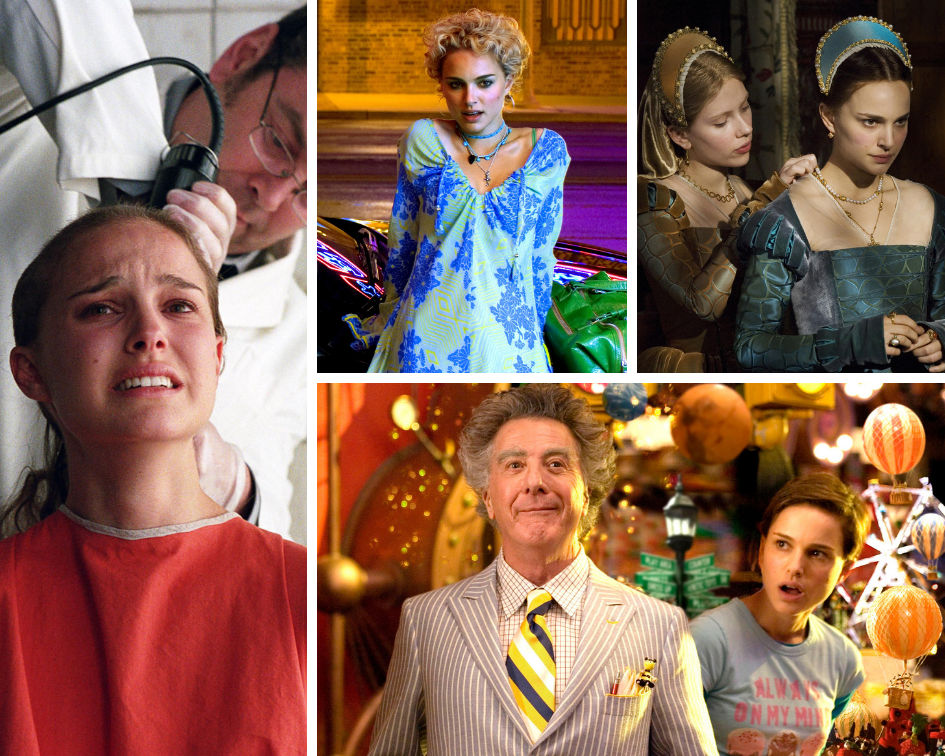
Rising Up: The Public Embrace Of Adulthood
“V for Vendetta” is tricky to position within Portman’s oeuvre. Discounting the little-known drama “Free Zone,” it was her first movie following “Star Wars: Episode III – Revenge of the Sith.” Like “Closer,” it struggled to decide whether Portman resembled a warrior or a tenderfoot. But unlike “Closer,” its iconography and lexicon (“Remember, remember the 5th of November”) became a pop culture phenomenon.
On the one hand, James McTeigue’s spectacular ― written by the Wachowski siblings and based on an ’80s comic-book series ― presents Portman’s Evey as a freedom fighter on the rise, someone who shaves her head and battles authoritarianism in a near-future dystopia. On the other hand, the film requires she don a pink schoolgirl get-up, including stockings and bows, to seduce a predatory priest, which feels as much like a straight man’s wet dream as it does a comeuppance subplot.
But in the wake of “V for Vendetta,” Portman doubled down on her self-awareness with something we hadn’t much seen from her: a sense of humor. In a profane Lonely Island short that aired on “Saturday Night Live” in March 2006, she skewered her good-girl image by rapping about drunk-driving, smoking weed, not wanting to be a role model and cheating on Harvard exams. Self-parody is the ultimate movie-star power move, and here it helped inch Portman toward a spate of mature roles.
Between 2006 and 2009, Portman appeared in “Goya’s Ghosts,” “Paris, je t’aime,” an episode of “The Simpsons,” “My Blueberry Nights” (pairing her with high-brow director Wong Kar-wai), “The Darjeeling Limited,” “The Other Boleyn Girl,” “The Other Woman,” “Brothers” and “New York, I Love You” (a segment of which she directed) ― glossy, disappointing projects that at least brought her out of the guileless fray and into adult dilemmas like motherhood, financial burdens, aimlessness and religious tolerance. (The family-friendly “Mr. Magorium’s Wonder Emporium” is an outlier, and Portman a disengaged participant. Somehow, she still managed to liken it to “The Love Song of J. Alfred Prufrock.”) In this period, if Portman didn’t exactly reclaim the authority she’d once brandished, she at least refined her sparkle. Many of the films required a thick accent and heavy disposition, just the thing that would further legitimize the humanitarian activism she’d undertaken off-screen.
Perhaps because the movies themselves weren’t anything special, critics were still split on Portman’s skills. In her “Brothers” review, Slate’s Dana Stevens wrote, “I can’t stand Natalie Portman. I’ve never believed her in a single role. She evokes no emotional response in me beyond, ‘Oh, there’s Natalie Portman.’ She doesn’t overact or underact; she just stands around with whatever the appropriate expression for the scene seems to be on her sweet, pretty, childlike face. If there’s something going on behind that face, I neither know nor care what it is.”
Portman was stuck in a miasma of soapy ensemble films when she should have been leading the charge. Whereas she used to be a scene stealer, she was now more like a spear carrier ― which is precisely what gave her the comeback narrative needed to sell “Black Swan.” And “Black Swan” is what reconfirmed the chutzpah that got lost as Portman waded through her complicated child-star-grown-up epoch.
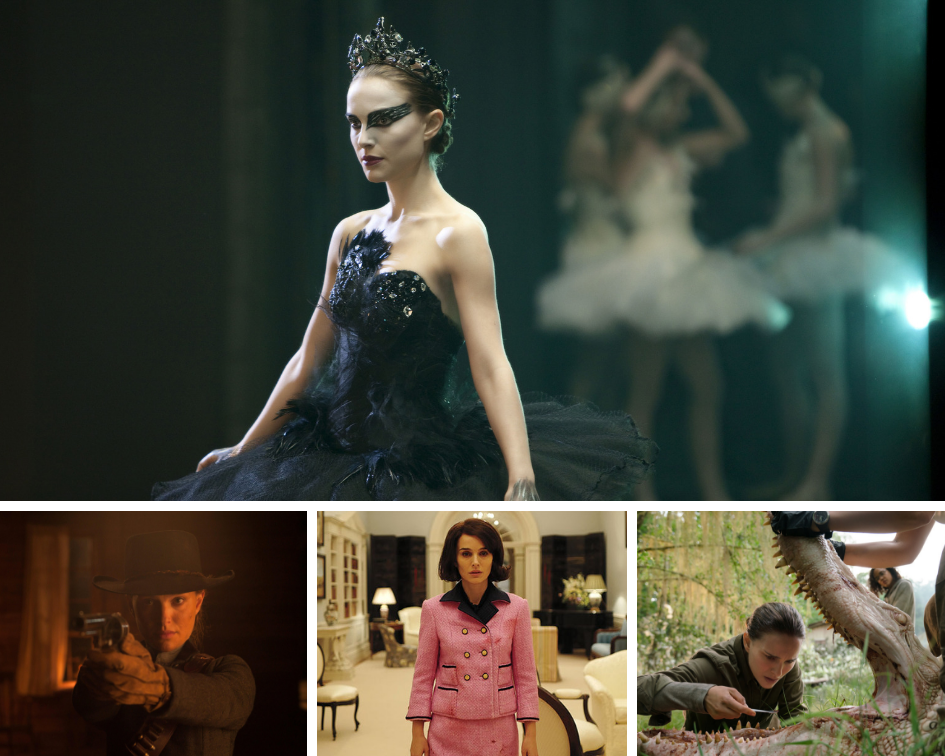
A New Sophisticate: Weathered And Winning
Portman’s career can be divided in half: pre-“Black Swan” and post-“Black Swan.” Darren Aronofsky, the director responsible for “Requiem for a Dream” and “The Wrestler,” had first discussed making a ballet movie with Portman back in 2000. But by late 2009, when they started shooting “Black Swan,” the experience took on a whole new meaning.
“As I’m getting older, it’s becoming more and more difficult to rest on the patterns of being sort of cute and girly,” Portman had said earlier that year, again revealing a mindfulness that veterans like Julia Roberts and Johnny Depp sometimes lacked. Hardly the sort of de-glammed indie that acts as a calculated career rebirth, “Black Swan” ― like “Swan Lake,” the production that inspired Aronofsky’s story ― married the two halves of Portman’s persona. She was the good girl gone bad, but with a twist: Her character, Nina Sayers, had a distinct, pulsating psychology that rooted her obsessive quest for perfection in personal history, the competitive New York dance scene and a hunger to abandon the arrested adolescence prescribed by her mother (Barbara Hershey). Nina refused to be a “sweet girl” any longer, and so did Portman. Armed with an operatic character arc, unconventional leading-lady stature and a grandeur that recalled “The Red Shoes” and “Repulsion,” Portman found what any famous actor longs for: material uncannily hewed to their own talents and reputation. That the role won her an Oscar isn’t even the most relevant thing about it.
Ever since, Portman has claimed a jurisdiction that extends even to her blockbuster endeavors. Her character in “No Strings Attached” (2011) is an underwritten garble, but at least the movie gave her a genre that had somehow eluded her: the romantic comedy. (Later, it would also let her lament the gender pay gap.) She helped sculpt Jane Foster in “Thor” (2011) and “Thor: The Dark World” (2013) ― hardly her most compelling work, but still an important marker of her feminist ideology, as she touted the heroine’s book-smart heft. The juvenile “Your Highness” (2011) was an unfortunate diversion for everyone involved ― seriously, it’s terrible ― but not many people saw it, so Portman sailed unscathed into arty Terrence Malick territory, bringing an inspired naturalism to “Knight of Cups” (2015) and the superior “Song to Song” (2017).
The gumption she’d showcased in “Black Swan” fully manifested with her feature-length directorial debut, “A Tale of Love and Darkness” (2015), an uncommercial passion project that let her tap into her Jewish roots and show off her Hebrew. No one could call her unworldly anymore. Portman perhaps shouldn’t have cast herself as a plagued midcentury Jerusalem mother, but “Love and Darkness” boasts an eye for tone and aesthetics. Her next starring role, in the revisionist Western “Jane Got a Gun” (2016), could have been a milestone, had the project not suffered production woes after its initial director, Lynne Ramsay, dropped out. Portman should have exited with Ramsay, but she stuck around for what became a noble misfire and a financial dud.
The spottiness of “Love and Darkness” and “Jane Got a Gun” made it all the more enrapturing when, in late 2016, Portman delivered a performance that rivaled “Black Swan.” I’m referring, of course, to “Jackie,” in which she plays Jacqueline Kennedy in the days after JFK’s 1963 assassination.
Portman walks a tightrope throughout Pablo Larraín’s brilliant psychodrama, again contending with what it means to put on a public performance, just as she did in “Black Swan.” In her hands, Jackie is forever on the cusp of a breakdown, and yet she remains stunningly composed, bottling up her grief and packaging it for the world’s prying consumption. To watch Portman in “Jackie,” shot largely in close-ups, is to realize that no one else could have played her. Maybe Portman’s familiarity with professional criticism helped her relate to the much-loved and much-loathed first lady, or maybe she’d become such a nuanced actress in her 30s that she could convey a dozen emotions with a soft smirk. Whatever it was, enough can’t be said of how important ― and perfect ― “Jackie” is for Portman, and Portman for it. Her enchanting stare, first seen two decades earlier, had never been put to such urgent use.
It’s the path that led her to “Vox Lux,” another fiery melodrama about public performances. If Portman channeled the Freudian superego in this year’s “Annihilation,” she’s total id in “Vox Lux” ― and that’s a far more salient dichotomy than the madonna-whore dynamic that once followed her. As a scientist exploring a trippy netherworld in “Annihilation,” she is calm and resolved; as an emotionally and intellectually scarred pop star in “Vox Lux,” she is brash and vituperative. But both movies present a steely reserve, and both are among her most dynamic work.
Just as “Black Swan” retooled Portman’s caliber, her off-screen persona throughout the ensuing decade has contributed to her renewed renown. Having dated Moby and Devendra Banhart, she married “Black Swan” choreographer Benjamin Millepied in 2012; they have two children together. She’s been an advocate for liberal causes like marriage equality, veganism (inspired by pen pal Jonathan Safran Foer) and the developing world, as well as a critic of the Israeli government. Portman sometimes seems standoffish, but that comes second to her vocal feminism, which has made her a key player in the Time’s Up movement.
No one in this day and age can look at Portman and still think of her as the little girl from “The Professional” and “Mars Attacks!” Part of that is fortuitous. The ebbs and flows of fame, after all, are not cooked in a vat and ladled out with precision. But Portman also deserves credit for much of it, for being a well-read, conscientious warrior who weathered critical disfavor, male directors’ sexualizing instincts and an ecosystem that once encouraged us to trash actresses. She has emerged the author of her own legacy, a true professional.
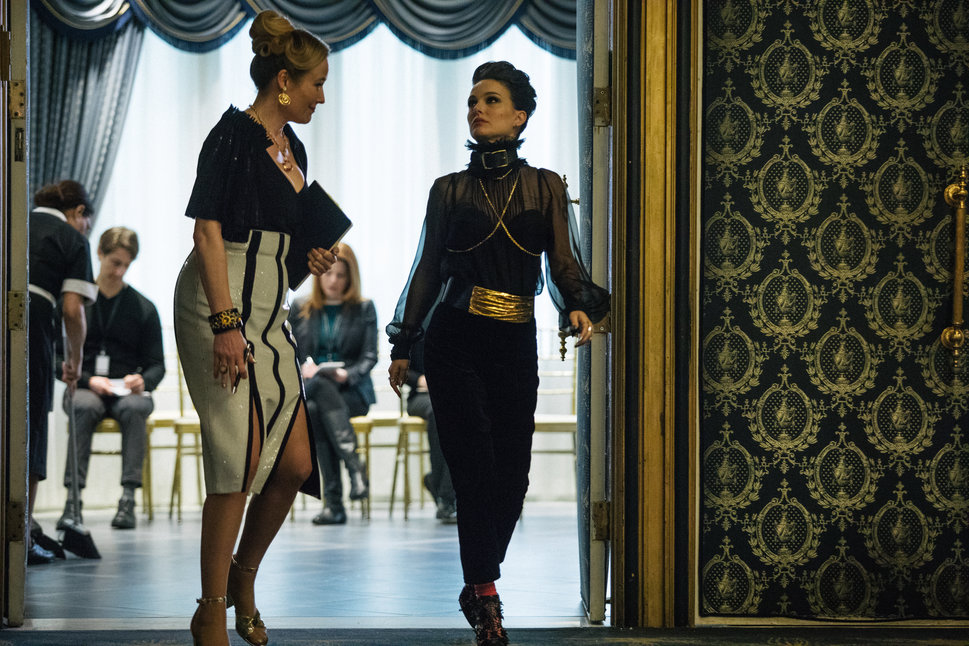
[ad_2]
Source link

